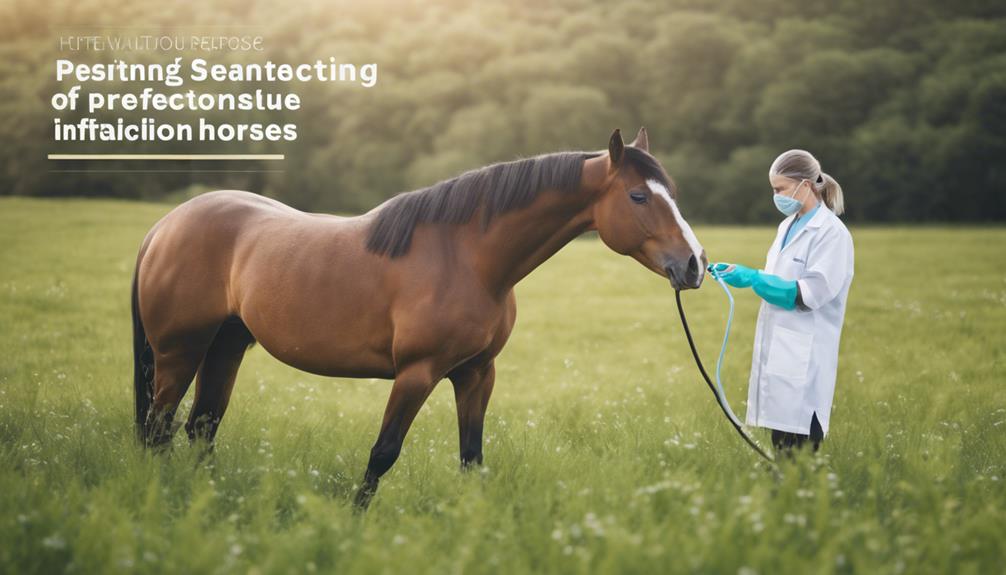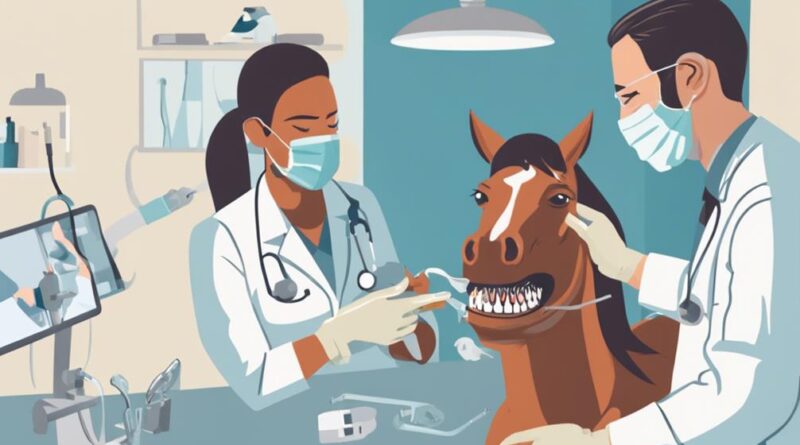What Does Equine Veterinary Medicine Treat in Horses?
Did you know that equine veterinary medicine extends far beyond routine check-ups and vaccinations for horses?
From common respiratory conditions to musculoskeletal injuries, gastrointestinal disorders to reproductive health concerns, there is a wide range of ailments that equine veterinarians address.
Understanding the intricacies of equine health is crucial for every horse owner or enthusiast, as being able to recognize symptoms and seek timely veterinary care can make a significant difference in the well-being of these majestic animals.
Common Equine Respiratory Conditions
When diagnosing common equine respiratory conditions, observing the horse's breathing patterns and overall demeanor is crucial for accurate treatment. Allergic reactions can cause respiratory distress in horses, leading to symptoms like coughing, nasal discharge, and difficulty breathing. To address allergic reactions, treatment options such as antihistamines, corticosteroids, and environmental management may be recommended by your veterinarian. It's essential to work closely with your vet to identify the specific allergen triggering the reaction to prevent future episodes.
Respiratory infections are another prevalent issue in horses, with prevention strategies playing a vital role in maintaining their health. Ensuring proper ventilation in the barn, minimizing dust exposure, and practicing good biosecurity measures can help reduce the risk of respiratory infections. Vaccinations against common respiratory pathogens, such as influenza and rhinopneumonitis, can also aid in preventing these infections. However, if a respiratory infection does occur, prompt veterinary attention is necessary to determine the appropriate treatment, which may include antibiotics, anti-inflammatories, and supportive care.
Gastrointestinal Disorders in Horses
Gastrointestinal disorders in horses can significantly impact their overall health and performance. Colic management is crucial in equine veterinary medicine, as colic is a common and potentially life-threatening condition in horses. Colic refers to abdominal pain and can have various causes, including intestinal blockages, gas accumulation, or changes in gut motility. Prompt recognition of colic symptoms and immediate veterinary intervention are essential to prevent complications and improve outcomes.
When it comes to ulcer prevention, maintaining a proper feeding routine is key. Horses should have access to forage constantly to help buffer stomach acid and prevent ulcer formation. Avoiding long periods without food and minimizing stress can also help reduce the risk of ulcers. Additionally, providing a low-starch, high-fiber diet can support gastrointestinal health and reduce the likelihood of ulcer development.
Regular veterinary check-ups and consultations are essential for monitoring your horse's gastrointestinal health. Your veterinarian can provide guidance on colic management strategies, ulcer prevention techniques, and overall digestive health maintenance. By staying proactive and attentive to your horse's digestive system, you can promote their well-being and ensure optimal performance.
Musculoskeletal Problems and Injuries
To maintain your horse's overall health and performance, it's essential to address musculoskeletal problems and injuries that may arise during their training and daily activities. Proper care in this area can significantly impact your horse's quality of life and athletic ability.
- Joint Health: Ensuring your horse's joints are healthy is crucial for their mobility and comfort. Regular check-ups and appropriate supplements can help maintain joint function and prevent issues.
- Rehabilitation: If your horse experiences a musculoskeletal injury, a well-structured rehabilitation plan is essential for their recovery. This may involve controlled exercise, physiotherapy, and possibly medication.
- Lameness: Detecting lameness early is vital in addressing musculoskeletal issues. Understanding the signs of lameness and seeking prompt veterinary care can prevent further complications.
- Diagnostic Techniques: Veterinary professionals use various diagnostic tools such as ultrasound, X-rays, and MRI scans to pinpoint musculoskeletal problems accurately. These techniques aid in developing effective treatment plans.
Skin and Hoof Issues in Horses
Skin and hoof issues in horses can significantly impact their well-being and performance, requiring careful attention and timely intervention for proper management. Allergies are common in horses and can manifest through skin issues like hives, itching, and hair loss. Veterinary treatments for allergies may include antihistamines, corticosteroids, or allergy testing to identify specific triggers. It's crucial to address allergies promptly to prevent further discomfort and potential complications.
Wound care is essential for maintaining healthy skin and hooves in horses. Proper wound care involves cleaning the wound thoroughly, applying appropriate medications, and bandaging to promote healing. Preventing wounds through safe turnout practices, regular grooming to check for injuries, and proper tack fitting can help minimize the risk of skin issues.
Hoof problems such as cracks, abscesses, or laminitis can significantly impact a horse's soundness. Regular hoof care by a farrier is essential to maintain hoof health, prevent issues, and address any abnormalities promptly. Treatments for hoof problems may include corrective trimming, shoeing, or therapeutic hoof packs to support healing and soundness.
Reproductive Health Concerns
Reproductive health concerns in horses play a crucial role in their overall well-being and breeding success. Addressing breeding challenges and fertility issues is essential for maintaining healthy horse populations. Hormonal imbalances can significantly impact a horse's ability to conceive and carry a foal to term, leading to pregnancy complications that require veterinary intervention.
- Breeding Challenges: Horses, like any other species, can face difficulties in successfully breeding. These challenges may stem from physical issues, behavioral problems, or underlying health conditions that affect reproduction.
- Fertility Issues: Maintaining optimal fertility in horses is vital for successful breeding programs. Factors such as age, health, and genetics can all influence a horse's fertility levels.
- Hormonal Imbalances: Hormones play a critical role in regulating the reproductive cycle in mares and stallions. Imbalances in hormone levels can disrupt normal breeding processes and lead to difficulties in conceiving.
- Pregnancy Complications: Just like in humans, horses can experience various complications during pregnancy. These can range from early pregnancy losses to difficulties during foaling that require medical attention.
- Veterinary Intervention: In cases of reproductive health concerns, timely veterinary intervention is crucial. Veterinarians can provide diagnostics, treatments, and management strategies to support the reproductive health of horses.
Maintaining a keen awareness of these reproductive health concerns is essential for ensuring the overall well-being and breeding success of horses.
Neurological Disorders in Equines
Neurological disorders frequently afflict equines, impacting their overall health and performance. Equine seizure management is a crucial aspect of veterinary care for horses with conditions like epilepsy. Understanding how to identify and respond to seizures is essential in providing proper treatment and ensuring the well-being of the animal.
Equine neurologic exams are also vital in diagnosing various neurological issues such as spinal cord injuries or nerve damage. These exams help veterinarians pinpoint the root cause of symptoms like gait abnormalities or loss of coordination.
In cases where equines suffer from neurological impairments due to injuries or illnesses, equine neurological rehabilitation plays a key role in aiding recovery. Through targeted exercises and therapies, horses can regain strength, coordination, and mobility, enhancing their quality of life.
Additionally, equine brain tumor treatment requires specialized care to address these complex and potentially life-threatening conditions. Veterinary professionals may recommend surgery, radiation therapy, or medication to manage or remove the tumor, depending on the specific case.
Parasitic Infections and Prevention

Parasitic infections pose a significant threat to equine health, requiring effective prevention strategies to safeguard your horse's well-being. To combat these risks, consider the following key points:
- Deworming strategies: Regular deworming is crucial to prevent parasitic infestations in horses. Work closely with your equine veterinarian to develop a deworming schedule tailored to your horse's specific needs.
- Resistance: Over time, parasites can develop resistance to certain dewormers. To combat this issue, it's essential to rotate the classes of dewormers used and conduct fecal egg counts to monitor effectiveness.
- Pasture management: Proper pasture management plays a vital role in parasite control. Implement practices such as regular manure removal, rotational grazing, and resting pastures to reduce parasite exposure.
- Parasite control: Besides deworming, other parasite control measures include environmental management and monitoring for signs of parasitic infection. Stay vigilant and address any potential issues promptly.
- Consultation: When in doubt about the best deworming strategies or pasture management practices, seek guidance from your equine veterinarian. They can provide expert advice tailored to your horse's unique circumstances.
Dental Care and Dental Diseases
Maintaining proper dental care is essential for ensuring your horse's overall health and preventing dental diseases. Dental hygiene and preventive care are crucial aspects of equine veterinary medicine. Regular dental check-ups by a qualified veterinarian can help detect any issues early on and prevent them from escalating into more serious problems.
Common dental diseases in horses include periodontal disease, dental caries, and malocclusions. These conditions can cause pain, difficulty eating, weight loss, and behavioral changes in your horse. Preventive measures such as routine dental floats, where sharp points on the teeth are filed down, can help avoid these issues.
In cases where dental diseases have progressed significantly, tooth extraction may be necessary. Treatment options for dental diseases in horses may also include the use of dental implants or specialized diets to aid in chewing for horses with missing teeth. It's important to follow your veterinarian's advice regarding dental care and treatment options to ensure the best possible outcome for your horse's dental health. Regular dental care not only improves your horse's quality of life but also prevents unnecessary pain and discomfort.
Frequently Asked Questions
How Can I Prevent My Horse From Developing Equine Metabolic Syndrome?
To prevent your horse from developing equine metabolic syndrome, focus on dietary management and an exercise routine. Ensure your horse has a balanced diet and regular physical activity to prevent insulin resistance.
Avoid high-sugar and high-starch feeds, and provide ample turnout time or exercise. By implementing these prevention strategies, you can help keep your horse healthy and reduce the risk of equine metabolic syndrome.
What Are Some Common Behavioral Issues in Horses and How Can They Be Addressed?
When dealing with common behavioral issues in horses, understanding equine psychology is key. Training techniques and proper handling can help address these challenges.
Behavioral modification plays a crucial role in shaping your horse's behavior. Consistency and positive reinforcement are effective strategies to tackle issues like aggression, fear, or disobedience.
Are There Any Alternative Therapies or Treatments for Equine Arthritis?
When it comes to treating equine arthritis, you have options beyond traditional methods. Acupuncture therapy, herbal remedies, massage therapy, and chiropractic care are alternative treatments that can help manage your horse's arthritis symptoms.
These therapies focus on pain relief, improved joint function, and overall well-being. Consulting with a qualified equine veterinarian can help you explore which alternative therapies may be beneficial for your horse's specific needs.
What Is the Significance of Regular Dental Care for Horses?
Regular dental care is crucial for your horse's overall health and performance. By preventing dental issues, you can enhance your horse's well-being and prevent diseases that may affect their ability to eat and perform.
Maintaining good dental health through routine check-ups and cleanings is essential in ensuring your horse's comfort and longevity. Make sure to schedule regular dental exams to keep your horse in top shape.
How Can I Best Manage My Horse's Weight and Nutrition to Prevent Obesity-Related Health Issues?
To manage your horse's weight and nutrition effectively, focus on exercise routines and grazing management. Incorporate dietary supplements and weight loss strategies as needed. Ensure your horse gets enough exercise and monitor their grazing to prevent overeating.
Consult with a veterinarian for a tailored plan that considers your horse's specific needs. By combining these approaches, you can help prevent obesity-related health issues in your horse.
Conclusion
In conclusion, equine veterinary medicine plays a crucial role in treating a wide range of health issues in horses.
From respiratory conditions and gastrointestinal disorders to musculoskeletal injuries and reproductive health concerns, veterinarians are dedicated to ensuring the well-being of these noble animals.
By addressing various medical issues such as skin and hoof problems, neurological disorders, parasitic infections, and dental care, equine veterinarians help keep horses healthy and thriving.
